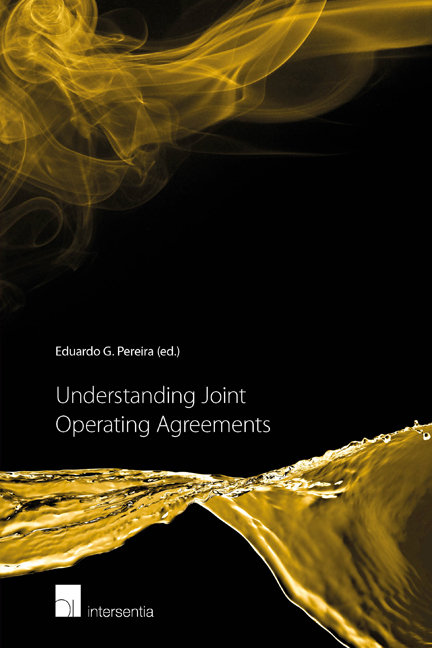Book contents
- Frontmatter
- Contents
- List of Abbreviations
- List of Authors
- Introduction
- PART I CONSIDERATIONS PRIOR TO ENTERING INTO A JOA
- 1 Bribery Laws and Compliance
- 2 The Relationship with Other Joint Venture Agreements
- 3 Unitisation and Unit Operating Agreements
- 4 Key Issues Relating to JOAs in Civil Law Countries
- 5 The Relationship between a JOA and a Host Government Instrument
- 6 Decommissioning Obligations, Practices and Procedures
- 7 Standards and Practices in JOAs across the Petroleum Industry
- 8 Modifying the Standard JOA to Accommodate Unconventional Petroleum Projects
- PART II SETTING UP A JOA
3 - Unitisation and Unit Operating Agreements
from PART I - CONSIDERATIONS PRIOR TO ENTERING INTO A JOA
Published online by Cambridge University Press: 15 December 2017
- Frontmatter
- Contents
- List of Abbreviations
- List of Authors
- Introduction
- PART I CONSIDERATIONS PRIOR TO ENTERING INTO A JOA
- 1 Bribery Laws and Compliance
- 2 The Relationship with Other Joint Venture Agreements
- 3 Unitisation and Unit Operating Agreements
- 4 Key Issues Relating to JOAs in Civil Law Countries
- 5 The Relationship between a JOA and a Host Government Instrument
- 6 Decommissioning Obligations, Practices and Procedures
- 7 Standards and Practices in JOAs across the Petroleum Industry
- 8 Modifying the Standard JOA to Accommodate Unconventional Petroleum Projects
- PART II SETTING UP A JOA
Summary
INTRODUCTION
Petroleum resources are typically owned by the host government of the country where these natural resources are located. If an investor has an interest in searching for and producing oil and gas, it is required for them to obtain permission from the relevant host government. Petroleum licences, production sharing agreements (PSAs), service agreements or combinations all exist as established ways to grant this permission, and without them the contracting party has no authority to conduct exploration and production operations.
The host government typically prefers to divest their portfolio of assets/ blocks within different companies and contracts. This is done by way of allocating different contract licence areas and licences to different licence holders. The licence holders then each enter into a separate agreement (i.e. a joint operating agreement) to regulate the relationship between them with respect to how they wish to jointly undertake exploration, development and production activities for that particular licence. However, as is oft en the case, nature does not easily fit within man-made rules. In the petroleum industry, this can be illustrated by oil and gas fields not always conforming to pre-defined property boundaries commonly referred as ‘ contract area ‘. This is because hydrocarbon reserves can oft en ‘ straddle ‘ two or more licences that would have no connection with each other otherwise.
The issue then arises as to how parties to different licences can extract hydrocarbons from these fields, having a commonality of purpose in the sense of maximising their potential and not unnecessarily depleting the field, as well as how they are then to split any revenues arising out of these operations that are to be undertaken under two (or more) different licences, how they are to manage these operations, and how they are to determine the respective licence holders ‘ interests. To address this issue, the oil and gas industry has developed the concept of the ‘ unitisation and unit operating agreement ‘ .
This chapter will look at some of the main features of a typical unitisation agreement, its main purpose, and its interaction with JOAs. It will focus in particular on intra-border unitisation (that is, unitisation of a field straddling two or more licences within the same national boundaries) and not deal with cross-border unitisation (i.e. the unitisation of a field which straddles licences within two or more different countries).
- Type
- Chapter
- Information
- Understanding Joint Operating Agreements , pp. 43 - 60Publisher: IntersentiaPrint publication year: 2016



